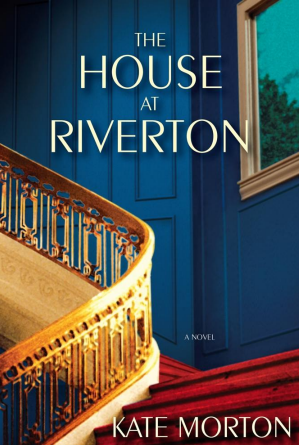By Leanna Pankratz (Contributor) – Email
Date Posted: October 26, 2011
Print Edition: October 19, 2011
 Kate Morton’s New York Times bestselling novel, The House at Riverton (2007), tells the story of 98-year-old Grace Bradley, a “onetime housemaid of Riverton Manor, [who] is visited by a young director making a film about a young poet’s suicide.” This visit sparks a sudden recollection of memories that bring Grace back to her youth spent as a maid at the grand English country home of Riverton – the residence of three captivating siblings named David, Hannah, Emmeline Hartford, and a mysterious young visitor named Robbie. Grace remains a loyal maid and confidante to the Hartford’s, and sees them move in and out of each other’s lives as they deal with World War I and its effects on British society. Most of all, Grace (through the quiet, all-seeing eyes of the household help) will watch the Hartford’s impact each other both powerfully and disastrously.
Kate Morton’s New York Times bestselling novel, The House at Riverton (2007), tells the story of 98-year-old Grace Bradley, a “onetime housemaid of Riverton Manor, [who] is visited by a young director making a film about a young poet’s suicide.” This visit sparks a sudden recollection of memories that bring Grace back to her youth spent as a maid at the grand English country home of Riverton – the residence of three captivating siblings named David, Hannah, Emmeline Hartford, and a mysterious young visitor named Robbie. Grace remains a loyal maid and confidante to the Hartford’s, and sees them move in and out of each other’s lives as they deal with World War I and its effects on British society. Most of all, Grace (through the quiet, all-seeing eyes of the household help) will watch the Hartford’s impact each other both powerfully and disastrously.
The story culminates in a glittering 1920s house party that results in the suicide of a poet who had more effect on the young ladies at Riverton than the Hartford family would have one believe. “Set as the war-shattered Edwardian summer surrenders to the decadent twenties, The House at Riverton is a thrilling mystery and a compelling love story.”
While The House at Riverton possesses a stunningly intricate and involved storyline, the plot and setting themselves cannot truly elevate the novel to the status of great literature, as Morton really does borrow a great amount from novels dealing with multi-generational sagas, English country houses, and World War I (namely Ian McEwan’s Atonement, which utilizes a similar premise of an elderly woman looking back on the circumstances of her life). As a result, The House at Riverton reads more like a homage to such novelists as McEwan, or mystery writers such as Nancy Mitford. Morton’s obvious fascination with the era and literature involving it is apparent in her development of The House at Riverton, and readers can sense her joy in conveying specific images pertaining to the time period.
The novel is spectacularly researched down to minute period details. Such attention to historical accuracy combined with Morton’s vividly descriptive writing gives readers a very clear picture of a pivotal point in history – the slow decline of an established social system. Morton presents the transition from stiff-upper-lip Edwardian aristocracy to the birth of a new Jazz Age as a backdrop to a story involving shell-shocked WWI veterans, servant loyalty, secret romance, and a mysterious suicide. Some specific details are included in an interview with Morton located at the end of the novel. (an interesting inclusion that allows readers a glimpse into the author’s creative process, and thoughts about characters and setting, as well as influences – Atonement and Nancy Mitford included).
The House at Riverton is an engrossing page-turner. While Morton’s plot risks taking itself too seriously at times (events are occasionally drawn out with much more significance than necessary), readers will note that this is a novel written with heart and revelry in the material, and should be consumed accordingly. Morton’s lush, evocative prose brings to life a tale that is sweepingly cinematic, and reads with the ease of watching a film. This novel is perfect for a rainy fall afternoon – escapism at its best. The storyline, while elaborate and time-spanning, is simple and earnest. Morton captures the exquisite ache of a society in transition, and its effects on individuals in various social classes as they grapple with their changing world. While by no means a groundbreaking piece of literature, it certainly provides movie-theater heartbreak, drama, murder, love affairs, along with classic plot twists and romantic lines. It’s a good old-fashioned mystery that provides good old-fashioned entertainment. In a world that depends more and more on irony and crazy artistic license, is this not a welcome change? One certainly might agree. Bring on the intrigue!

